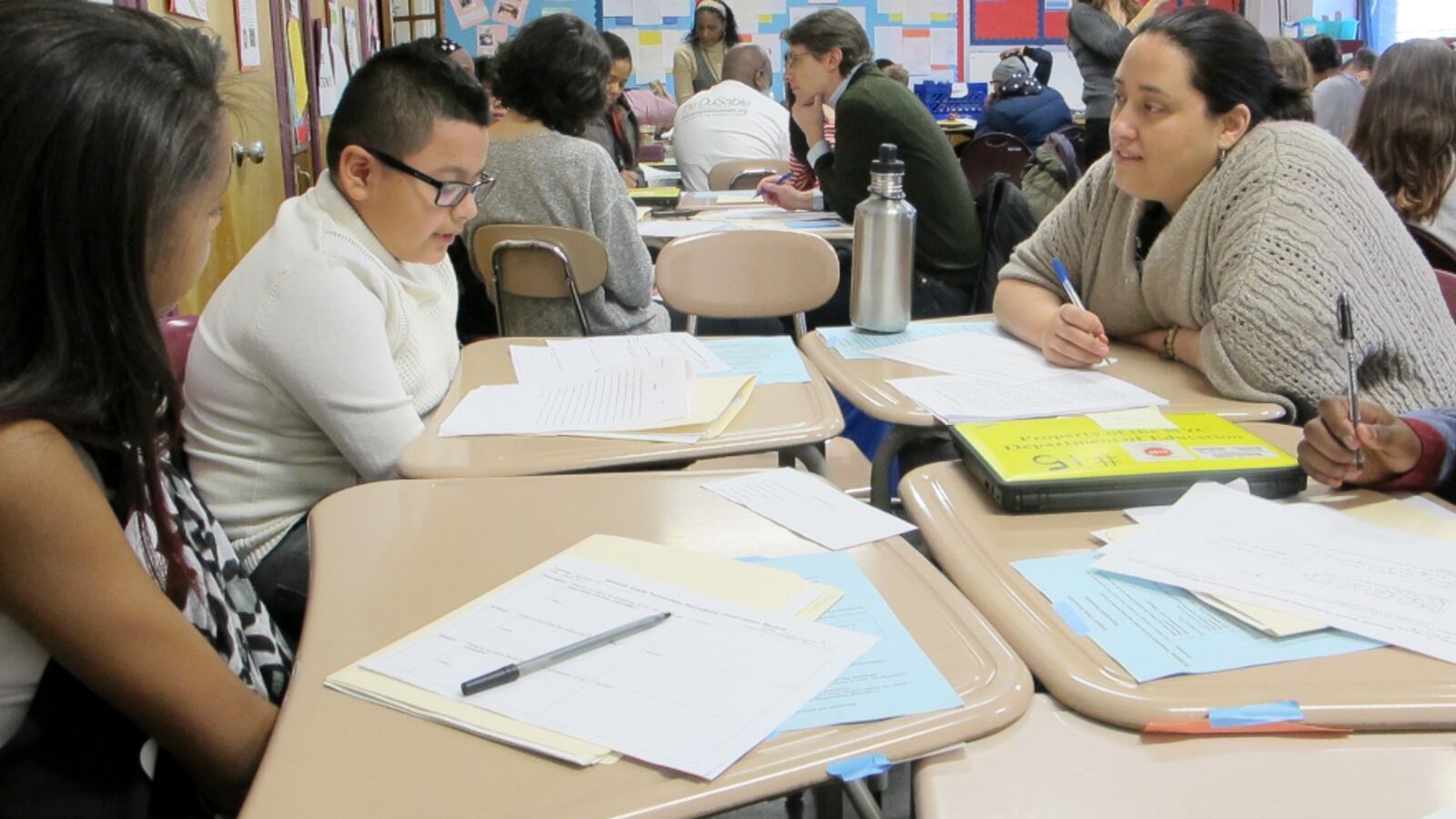The proposed teachers contract stakes a claim about the time educators spend with students: quality beats quantity.
The new agreement would upend a key provision of the 2005 contract, which added two-and-a-half hours to the school week so teachers could work with small group of students. Now, most of that time would be devoted to teacher professional development and some to parent outreach.
The idea behind the contract changes, officials explained, is that better-trained teachers will have a greater impact on students even if they spend less time with them.
“We have to train teachers so that the time they’re spending with students is much more effective and valuable,” said United Federation of Teachers President Michael Mulgrew. “Versus doing, once again, this political punch line — more time with the student. Let’s make it better time with the student.”
While that approach makes sense to many, others note that professional development can vary widely in quality, and they question whether teacher training ever trumps instructional time.
“I honestly have never met one teacher who thinks the solution to the educational crisis is less time with students and more time in PD,” wrote the author of the education blog, Doenuts.
The 2005 contract had most schools divide two-and-a-half hours per week, or 150 minutes, into four after-school tutoring or small-group sessions each week, with some exceptions. “Multi-session” schools that have staggered starts were allowed to spread those extra minutes throughout their normal school day. Also, schools could request to use some of that time for teacher-team planning rather than tutoring.
The new contract, which must still be ratified, would take back those 150 minutes and split them into three chunks: teachers would spend 80 minutes each Monday in school-based professional development, 35 minutes on Tuesdays collaborating with colleagues, and another 40 minutes each Tuesday communicating with parents in writing, on the phone, or through newsletters and class websites.
Not every school would be affected by the change. Multi-session schools will again be exempt from this default arrangement, though they will be expected to provide professional development and parent engagement, according to union officials. Also, schools that prefer their current arrangement with the extra instructional time could request an exemption that would allow them to keep some part of their schedule.
Chancellor Carmen Fariña said that schools could pay teachers to tutor students after-school or on Saturdays with money saved by running their own professional development rather than hiring outside trainers. Also, the new contract would allow up to 200 schools to restructure their school days, potentially freeing them to add more small-group time.
After details about the proposed contract emerged last week, some educators expressed concern about trading extra instructional time for teacher training, which might not be helpful.
Peter Lamphere, a high school math teacher in Washington Heights, said some school leaders carefully consider teachers’ needs and plan professional development where educators help each other improve. But other administrators run top-down, unhelpful trainings.
“Now they’ll have 80 minutes to do that rather than a faculty conference once per month,” he said. “So it could be torture for some people.”
Others questioned whether the contract needs to set aside time for parent communication, which most teachers already find time to do without such provisions, said Evan Schwartz, principal of the Bronx’s Alfred E. Smith High School.
“It wasn’t like they were sitting around saying, ‘I have these great creative ideas, but it’s not in my contract so I’m not doing them,’” he said.
But other people who work in schools welcomed the extra time for training and collaboration.
Darlene Cameron, principal of P.S. 63 in the East Village, said the after-school time built into the current contract has helped some struggling students but is not a perfect system, since some students resist staying after the normal school day and some parents pick them up before the sessions end. She said now the school will find time to offer those students extra support during the school day and that the new training sessions could focus on ways to reach those students during class.
“I think in the end this will have a bigger impact for children all around,” she said.
Teacher committees at each school will help decide how to use the new training time, though a main focus will be on the Common Core standards and the city will offer some guidance, officials said. Fariña said teachers could spend some of the time writing curriculum or sharing best practices.
“This is peer-to-peer, teacher-to-teacher,” she said, “And it really is, to me, a dream come true.”
Research has shown that when teachers meet for about 90 minutes per week to plan lessons, analyze student work, or devise supports for students with special needs, it can boost student achievement, said Lynette Guastaferro, executive director of Teaching Matters, an organization that works with public schools to increase teacher effectiveness.
She added that the new learning standards place greater demands on educators and make regular professional development even more essential.
“When our entire educational force has to reboot because of the Common Core, it is essential that teachers have time to learn,” she said.

